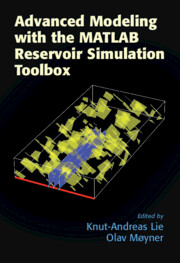Book contents
- Frontmatter
- Contents
- List of Contributors
- Preface
- Acknowledgments
- Navigating the Book and the MRST Modules
- Part I Grid Generation, Discretizations, and Solvers
- 1 Unstructured PEBI Grids Conforming to Lower-Dimensional Objects
- 2 Nonlinear Finite-Volume Methods for the Flow Equation in Porous Media
- 3 Implicit Discontinuous Galerkin Methods for Transport Equations in Porous Media
- 4 Multiscale Pressure Solvers for Stratigraphic and Polytopal Grids
- Part II Rapid Prototyping and Accelerated Computation
- Part III Modeling of New Physical Processes
4 - Multiscale Pressure Solvers for Stratigraphic and Polytopal Grids
from Part I - Grid Generation, Discretizations, and Solvers
Published online by Cambridge University Press: 20 November 2021
- Frontmatter
- Contents
- List of Contributors
- Preface
- Acknowledgments
- Navigating the Book and the MRST Modules
- Part I Grid Generation, Discretizations, and Solvers
- 1 Unstructured PEBI Grids Conforming to Lower-Dimensional Objects
- 2 Nonlinear Finite-Volume Methods for the Flow Equation in Porous Media
- 3 Implicit Discontinuous Galerkin Methods for Transport Equations in Porous Media
- 4 Multiscale Pressure Solvers for Stratigraphic and Polytopal Grids
- Part II Rapid Prototyping and Accelerated Computation
- Part III Modeling of New Physical Processes
Summary
The multiscale restricted-smoothed basis (MsRSB) method is the current state-of-the-art within multiscale methods. MsRSB is very robust and versatile can be used either as an approximate coarse-scale solver having mass-conservative subscale resolution or as an iterative fine-scale solver that will provide mass-conservative solutions for any given tolerance. The performance of the method has been demonstrated on incompressible two-phase flow, compressible two- and three-phase black-oil models, as well as compositional models. It has also been demonstrated that the method can utilize combinations of multiple prolongation operators; e.g., corresponding to coarse grids with different resolutions, adapting to geological features, adapting to wells, or moving displacement fronts. This chapter explains the basic ideas of the MsRSB method, including methods to construct coarse partitions, prolongation, and restriction operators; reduction of the fine-scale flow equations to a coarse-scale system; and formulation as part of a two-level iterative solver. We outline the key functions in the module and show various examples of how the method can be used as an iterative solver for incompressible and compressible flow on 2D rectilinear grids, unstructured grids, and 3D stratigraphic grids.
Keywords
- Type
- Chapter
- Information
- Publisher: Cambridge University PressPrint publication year: 2021
- Creative Commons
- This content is Open Access and distributed under the terms of the Creative Commons Attribution licence CC-BY-NC-ND 4.0 https://creativecommons.org/cclicenses/

